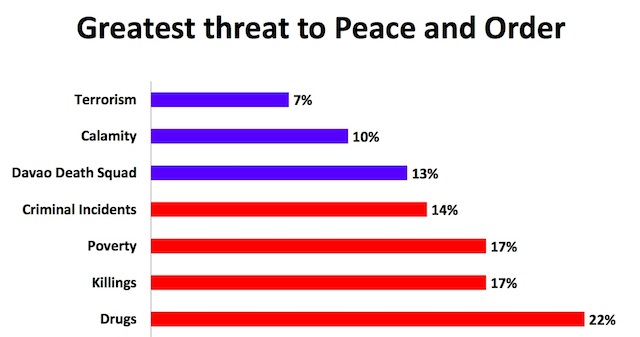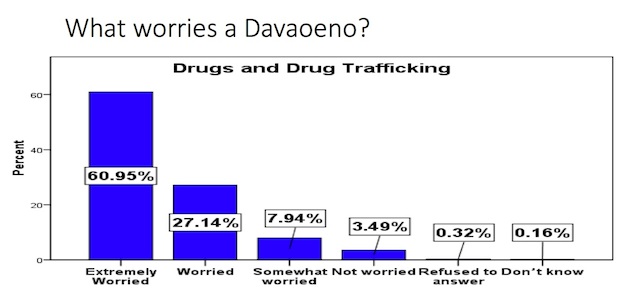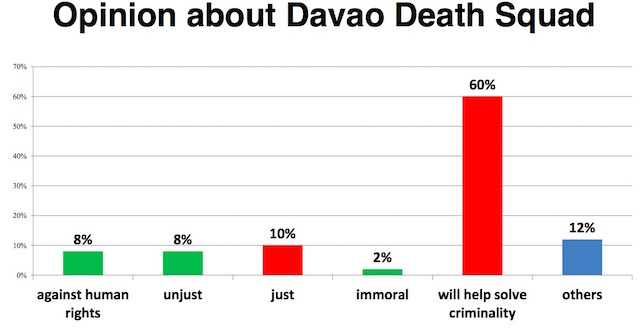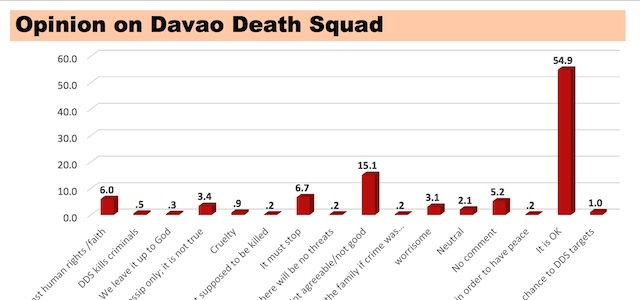DAVAO CITY (MindaNews/12 October) — For a city whose fight against illegal drugs in the last two decades has been bloody and involved summary executions by what has been generally referred to as the Davao Death Squad (DDS), Dabawenyos still consider illegal drugs as the “greatest threat to peace and order” and DDS is “ok” and “will help solve criminality,” results culled from the “peace and order” section of a series of five city-wide social surveys (CWSS) in the last two years show.
 From CWSS 5 of the Social Research Training and Development Office, Ateneo de Davao University
From CWSS 5 of the Social Research Training and Development Office, Ateneo de Davao University
The latest of the series (CWSS 5) conducted by the Ateneo de Davao University’s Social Research Training and Development Office (SRTDO) through face-to-face interviews from a random sampling of 630 adults across three districts on May 25-30, 2016 showed that drugs remains the “greatest threat to peace and order” at 22%, followed by killings which tied with poverty at 17%, criminal incidents (14%), Davao Death Squad (13%), calamity (10%) and terrorism (7%).
The five surveys were all held under the seventh term of Mayor Rodrigo Duerte CWSS done while he was already the presumptive President of the Republic of the Philippines. Duterte was proclaimed winner of the May 9 polls on May 30.
 From CWSS 4 of the Social Research Training and Development Office, Ateneo de Davao University
From CWSS 4 of the Social Research Training and Development Office, Ateneo de Davao University
In the CWSS 4 on Oct 19-24, 2015, “drugs and drug trafficking” was what 60.95% of Dabawenyos were “extremely worried” about, followed by killings (50.32%) poverty (49.21%), calamities (42.38%), terrorist type of bombings (41.59%) and Davao Death Squad (36.19%).
In the CWSS 3 on May 11-17, 2015, drugs/drug trafficking topped the category “perceived greatest threat to peace and order,” at 33.2% followed by violent crimes (26.6%), terrorism (16.3%), juvenile delinquency (10.4%) and insurgency (3.7%).
In the CWSS 2 on October 20-26, 2014, “drugs, drug trafficking” topped the same category at 43.7% followed by violent crimes/assaults threats (19.8%), terrorism (18.4%), juvenile delinquency (8.4%) and circulation of loose firearms (3.0%)
In the CWSS 1 on April 9 to 16, 2014, “illegal drug trafficking” topped the “threats to peace and order” for 213 out of 632 respondents or 33.7%.
In CWSS 3, “drugs and drug trafficking” was number one in the “Top 5 local problems” at 37.2%, nearly thrice the second placer “lack of livelihood and employment opportunities” (13.6%), killing and other crimes (11.2%), poverty (9.7%) and traffic system (3.0%).
Davao Death Squad
In the CWSS 5 held in May this year, the survey asked: “is there a fair justice system in the Philippines?” Only 4% voted yes, 28% said “don’t know” while 68% said “no.”
At the Panel 1 discussion in the Philippine Sociological Society National Convention at the Ateneo de Davao University last Friday, Dr. Christine Garcia, Director of the ADDU’s SRTDO, presented excerpts from CWSS 5 under the title, “Governance, Peace and Order, Performance of Government Officials and Post-election Views” and the data on “greatest threats to peace and order” as well as the Dabawenyos’ opinions on the DDS generated much interest from the audience that included Dr. Mary Racelis, Professorial Lecturer at the Department of Sociology and Anthropology at the Ateneo de Manila University.
 From CWSS 5 of the Social Research Training and Development Office, Ateneo de Davao University
From CWSS 5 of the Social Research Training and Development Office, Ateneo de Davao University
Asked about their opinion on the DDS, the CWSS 5 showed that 60% said the DDS “will help solve criminality,” 10% said it is “just,” while only 18% said it won’t because the DDS is “against human rights” (8% ), is “unjust” (8%) and “immoral” (2%).
More females said DDS “will solve criminality” (63%) compared with males (58%). The data, however, has not been disaggregated as to socio-economic classes, a concern Racelis raised.
“Did you disaggregate by social class or social class levels?” Racelis asked.
She said she wants to know if those who don’t agree are “systematically from the groups who are presumably being killed, I mean from the so-called lower classes.”
She noted that it would be important to know from what social class they are coming from “or whatever the minorities are because one can‘t just dismiss those minorities because they’re a small group. If they’re systematically a certain group, I think we ought to know that,” she said.
Diaz said what she presented was “a general picture of the perception of the Dabawenyos about the DDS” and the disaggregation by sex. Diaz said they will consider more cross tabulations of their data.
Racelis said that for those like her who live in Manila or other parts, they want to know “to what extent the Davao information might reflect or have an impact on the national picture. I think it is important to know who is against in his own situation and are they systematically the ones who are the victims?”
President Duterte’s war on drugs at the national level has generated a broad support from the public but criticisms have been raised against the rising number of alleged extrajudicial killings of suspected drug users and pushers.
A recent survey of the Social Weather Stations showed an 84% satisfaction with the government’s campaign against illegal drugs (54% very satisfied and 30% somewhat satisfied), with Mindanao giving Duterte the highest rating at 87%.
But Mindanao posted the lowest mark on the importance of keeping suspects in the illegal drugs trade alive. Nationwide, 71% said they find it “very important,” with Visayas posting the highest at 82%, NCR at 74%, balance of Luzon at 70%, and Mindanao, the lowest at 62%.
Diaz thanked Racelis for the suggestion. She explained that the opinion poll on the DDS started only on the fourth of the CWSS series. “We started asking that in the fourth run and in the fifth run because we felt that it’s high time to confront the issue because there’s a lot of chismis about it so we want to know about the views of the Dabawenyos.”
Diaz told MindaNews on Monday that the opinion poll on the DDS was included in CWSS 4 and 5 “because it is one of the burning issues in the city. The research team thought that there is a need to confront the issue and come up with empiric data on the perceptions of Davaoeños about the DDS.”
On the issue of “drugs and drug trafficking” as the consistent number one under “greatest threats to peace and order,” Diaz said this is “among the perceived threats from the standpoint of the respondents. The empiric data suggest that Davao city is not insulated from the drug issue. It sends a signal to the government to address such issue.”
Diaz’ presentation last Friday focused only on the figures in the CWSS 5 conducted in May 2016. MindaNews checked all the peace and order sections of the five CWSS to see the trend. (see links below).
 From CWSS 4 of the Social Research Training and Development Office, Ateneo de Davao University
From CWSS 4 of the Social Research Training and Development Office, Ateneo de Davao University
A check on the CWSS 4 held on October 19 to 24, 2015 shows that 36.19% of Dabawenyos are “extremely worried” about the DDS, 30.32% are “worried,” and 21.75% “somewhat worried.”
But even as they are worried, more than half of the Dabawenyos or 55.6% approve of the DDS: 54.9% say the DDS is “ok;” .2 % say it is “ok in order to have peace;” and .5 % say “DDS kills criminals.”
Those who do not approve of the DDS constitute about 33.4%: “not agreeable/not good” (15.1%); “it must stop” (6.7%); “against human rights/faith (6%); “worrisome” (3.1%); “give chance to DDS targets” (1.0%); “some are not supposed to be killed” (2%); “it must stop so there will be no threats (2%); “cruelty” (.9%); “difficult for the family if crime was..” (.2%).
Eleven per cent gave no comment, or were “neutral” or left it up to God: 5.2% said “no comment;” 2.1% replied “neutral;” and .3% said “we leave it up to God.”
The existence of the DDS has been repeatedly denied by authorities. But only 3.4%, of the Dabawenyos, according to CWSS 4, do not believe there is a DDS: “gossip only, it is not true.” (Carolyn O. Arguillas / MindaNews)
CWSS 5
http://research.addu.edu.ph/2016/06/22/city-wide-social-survey-series-5/
CWSS 4
http://research.addu.edu.ph/2015/12/02/city-wide-social-survey-series-4/
CWSS 3
http://research.addu.edu.ph/2015/06/24/city-wide-social-survey-series-3/
CWSS 2
http://research.addu.edu.ph/2014/12/11/city-wide-social-survey-series-2/
CWSS 1
http://research.addu.edu.ph/2014/05/09/city-wide-social-survey-series-1/
